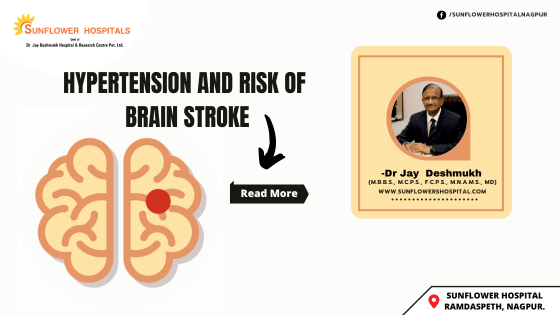Why blood pressure assessment and control are important in India?
Almost 40% population above 60 years suffers from hypertension. Of these, only 30% have their blood pressure under control. Almost 80% of strokes are caused by hypertension and other risk factors. Controlling blood pressure and keeping it at the lower end of the normal blood pressure range has enormous benefits.
Why prevention of brain stroke important?
A brain stroke may lead to permanent brain damage. This may also lead to significant physical disability. In fact, many prefer death to survive a major brain stroke. Brain stroke survivors have a significantly impaired quality of life. This pertains to speech, writing, memory, self-care, driving, climbing stairs, and increased risk of seizures. This carries with it a tremendous physical, social, sexual, and financial disability. This also affects the morale of the person affected and his family members too.
What should be normal blood pressure in order to prevent a stroke?
Any blood pressure below 135/85 in the middle-aged, and the elderly will prevent a stroke. Most individuals above this value may not have symptoms. Hence, self-monitoring of blood pressure at home in a relaxed frame of mind is necessary. Home blood pressure readings should be around 120/80. Blood pressure should be measured at 8 am and 8 pm almost daily, particularly in those who have high blood pressure. Readings above normal should be informed to the family doctor and necessary corrective steps should be taken.
Which is more important, reducing systolic or diastolic BP?
In lay terms, it is also known as upper and lower blood pressure. In the elderly, systolic blood pressure is more important than diastolic. However, diastolic BP should be maintained below 90 mm. For each 5 mm reduction in diastolic BP, the In almost many, hypertension is not associated with symptoms. Uncontrolled hypertension may, however, predispose to many disorders including a brain stroke, heart attack, heart failure, and progressive damage to the retina, kidneys, and peripheral vessels. Effective management of blood pressure is the key to preventing these complications. The risk of stroke decreases by almost half. A 41% reduction in stroke risk is associated with a 10 mm decline in systolic blood pressure.
What about maintaining blood pressure at a lower range than normal blood pressure?
A blood pressure reading of 110/70 will have more health benefits than 140/90 at the middle age level. Even in the normal range, the lowest tolerated blood pressure should be the ideal blood pressure to prevent stroke.
Which is the ideal drug to reduce blood pressure?
Scientists agree that lowering blood pressure is more important than the type of drug used to treat hypertension. It is not that one size that fits all. The medications used depend on individual preference, associated heart, kidney, diabetes, high cholesterol, and smoking habits Treatment of blood pressure is a lifelong commitment. This includes low salt intake, exercises, and yoga, maintaining ideal body weight, reducing alcohol intake, and quitting tobacco in any form.
Should treatment for blood pressure be stopped if there are no symptoms?
This is a very common mistake. Medications should never be stopped. The doses and types of medications may change over a period of time. Proper lifestyle changes can bring about a substantial reduction in doses.
What are the other risk factors for stroke?
Besides, high blood pressure, diabetes, high cholesterol, underlying cardiovascular illness including atrial fibrillation, and renal disease may predispose to stroke. Smoking, obesity, and a family history of stroke are also relevant.
What should be the blood pressure management after a stroke?
During rehabilitation, proper blood pressure management includes preventing significant falls in blood pressure on standing, avoiding lowering potassium and sodium values below normal, and having good physical activity based on clinical advice. Elevation in blood pressure shows a close correlation with stroke, cardiovascular disease, peripheral arterial disease, and end-stage renal disease. Lowering blood pressure is associated with a lower incidence of stroke, individuals should concentrate on proper lifestyle changes and appropriate drug treatment.
Author: Dr Jay Deshmukh
Dr Jay Deshmukh is Chief Physician and Director, Sunflower Hospital, Nagpur Honorary Physician to Honorable Governor of Maharashtra and PondicherryCentral. Dr Jay Deshmukh is an M.B.B.S., M.C.P.S., F.C.P.S., M.N.A.M.S., MD From Internal Medicine – Bombay and New Delhi.


